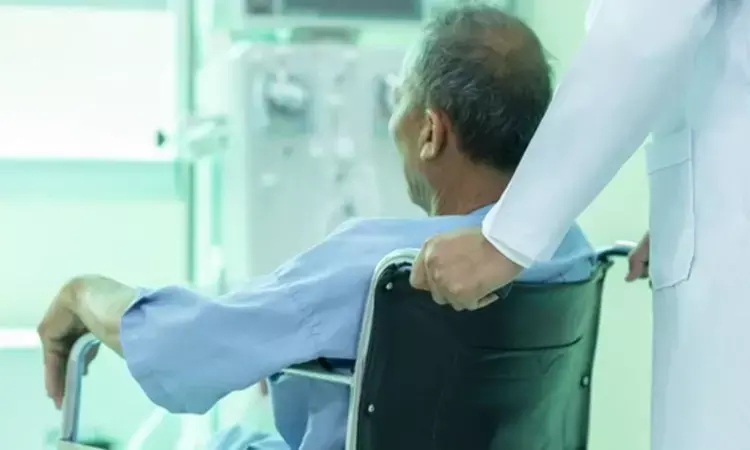- Home
- Medical news & Guidelines
- Anesthesiology
- Cardiology and CTVS
- Critical Care
- Dentistry
- Dermatology
- Diabetes and Endocrinology
- ENT
- Gastroenterology
- Medicine
- Nephrology
- Neurology
- Obstretics-Gynaecology
- Oncology
- Ophthalmology
- Orthopaedics
- Pediatrics-Neonatology
- Psychiatry
- Pulmonology
- Radiology
- Surgery
- Urology
- Laboratory Medicine
- Diet
- Nursing
- Paramedical
- Physiotherapy
- Health news
- Fact Check
- Bone Health Fact Check
- Brain Health Fact Check
- Cancer Related Fact Check
- Child Care Fact Check
- Dental and oral health fact check
- Diabetes and metabolic health fact check
- Diet and Nutrition Fact Check
- Eye and ENT Care Fact Check
- Fitness fact check
- Gut health fact check
- Heart health fact check
- Kidney health fact check
- Medical education fact check
- Men's health fact check
- Respiratory fact check
- Skin and hair care fact check
- Vaccine and Immunization fact check
- Women's health fact check
- AYUSH
- State News
- Andaman and Nicobar Islands
- Andhra Pradesh
- Arunachal Pradesh
- Assam
- Bihar
- Chandigarh
- Chattisgarh
- Dadra and Nagar Haveli
- Daman and Diu
- Delhi
- Goa
- Gujarat
- Haryana
- Himachal Pradesh
- Jammu & Kashmir
- Jharkhand
- Karnataka
- Kerala
- Ladakh
- Lakshadweep
- Madhya Pradesh
- Maharashtra
- Manipur
- Meghalaya
- Mizoram
- Nagaland
- Odisha
- Puducherry
- Punjab
- Rajasthan
- Sikkim
- Tamil Nadu
- Telangana
- Tripura
- Uttar Pradesh
- Uttrakhand
- West Bengal
- Medical Education
- Industry
Wheelchair users at higher risk of complications, readmissions after total shoulder arthroplasty

CMCH Misuses Medical Equipment for Waste Transport, Delaying Patient Care
USA: A recent study published in the Journal of Clinical Medicine has shown that wheelchair use is associated with increased readmissions and complications one year after total shoulder arthroplasty (TSA). For wheelchair users, the readmission rates were 24.05% and 9.55% for non-wheelchair users.
In the US, about 3.3 million individuals use an electric or manual wheelchair as their primary means of mobility, and nearly 2 million users are above the age of 65. The prevalence of shoulder pathologies is high in this wheelchair-dependent population, with 33–62% of wheelchair users reporting decreased quality of life and compromised independent living.
The currently available literature delineates the benefits and risks of surgical techniques for managing shoulder pathologies. According to the authors, no study has investigated complications following TSA in wheelchair users. To fill this knowledge gap, Kevin Prabhu, UT Southwestern Medical Center, Medical School, Dallas, TX, USA, and colleagues aimed to assess the 1-year preoperative comorbidities, readmission rates, and postoperative complications after TSA among wheelchair users.
They hypothesized that wheelchair use would be tied to increased rates of postoperative complications and preoperative comorbidities within one year of TSA compared to patients who did not use wheelchairs. They also hypothesized that wheelchair users were more likely to be readmitted postoperatively after TSA compared to non-wheelchair users.
The study included 72,108 patients who underwent TSA with a concurrent diagnosis of a rotator cuff tear, using the PearlDiver Mariner national administrative database. Two matched cohorts were created: one of wheelchair users and one of non-wheelchair users.
Owing to limitations within PearlDiver, one-year outcomes, including complication rates and comorbidity and readmission statistics, were compared between the two cohorts. Each matched cohort comprising 869 patients underwent TSA with a concurrent diagnosis of a rotator cuff tear.
The researchers reported the following findings:
- The rate of readmission in wheelchair users was greater than in non-wheelchair users (24.05% versus 9.55%, OR: 3.00).
- Patients in the wheelchair cohort exhibited higher rates of complications and comorbidities.
- Among the most likely to be readmitted after TSA were patients with osteoarthritis, rheumatoid arthritis, pulmonary heart disease, and hypertension.
- Significant differences in surgical outcomes existed between wheelchair and non-wheelchair users in terms of postoperative complications, preoperative comorbidities, and readmission rates.
"Our results demonstrate that wheelchair users are at risk of a higher complication profile after TSA compared to non-wheelchair users," the researchers wrote.
"Therefore, the findings suggest that patients should be adequately counselled on the benefits and risks before electing to pursue surgical intervention. Specifically, an important consideration during pre-surgical counselling is adequate identification of the optimal length of rehabilitation and immobilization during the postoperative period."
"Such individualized care would aid in clear communication between the rehabilitation team, surgical team, patient, and the patient’s family, therefore conceivably minimizing postoperative complications," they concluded.
Reference:
Prabhu, K., Nasr, A. J., Kasitinon, D., Cabrera, A., & Lin, Y. (2022). Perioperative Outcomes, Comorbidities, and Complications following Total Shoulder Arthroplasty in Wheelchair Users: A Retrospective Cohort Analysis of a Nationwide Database. Journal of Clinical Medicine, 12(18), 5799. https://doi.org/10.3390/jcm12185799
Dr Kamal Kant Kohli-MBBS, DTCD- a chest specialist with more than 30 years of practice and a flair for writing clinical articles, Dr Kamal Kant Kohli joined Medical Dialogues as a Chief Editor of Medical News. Besides writing articles, as an editor, he proofreads and verifies all the medical content published on Medical Dialogues including those coming from journals, studies,medical conferences,guidelines etc. Email: drkohli@medicaldialogues.in. Contact no. 011-43720751


